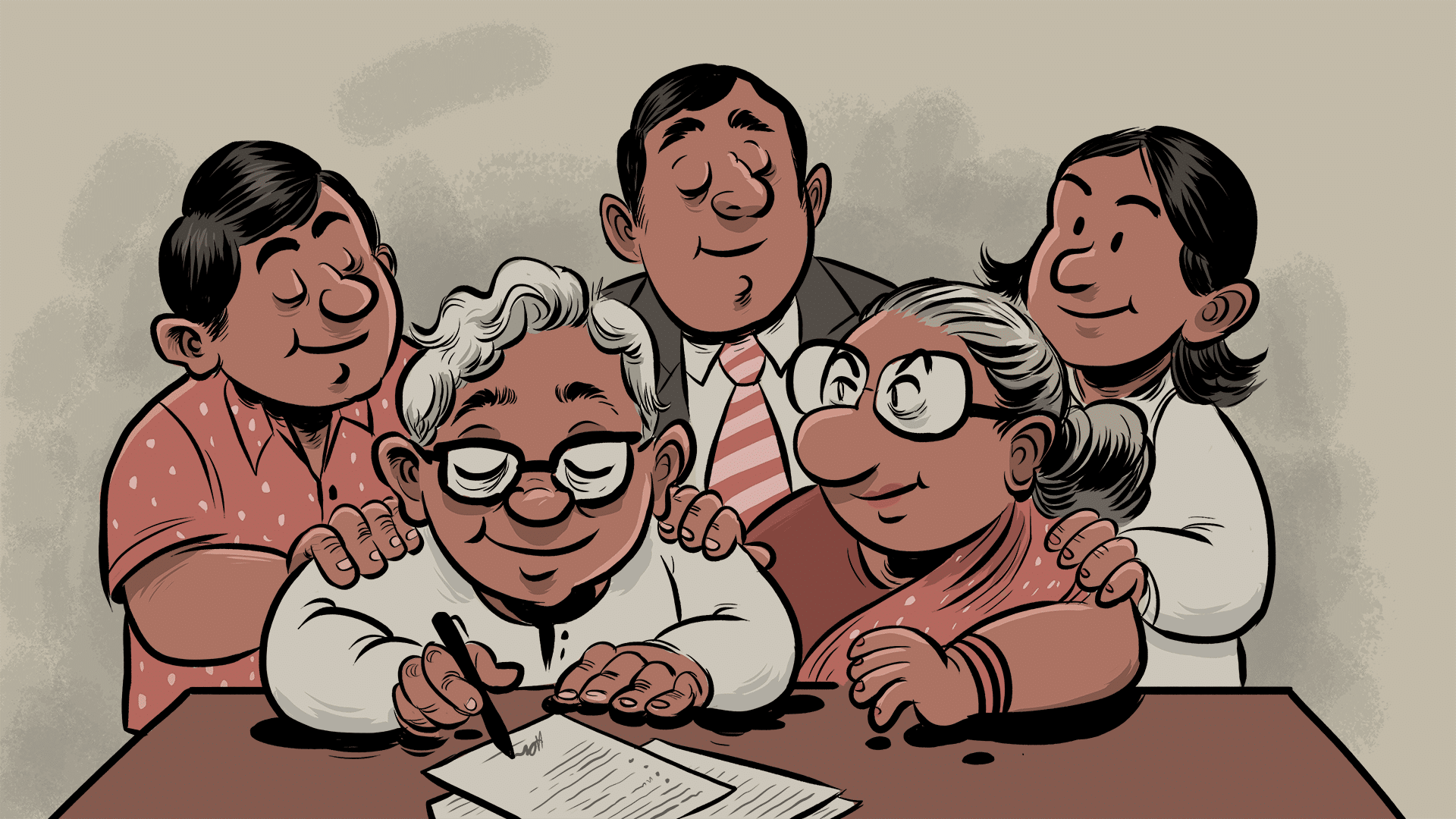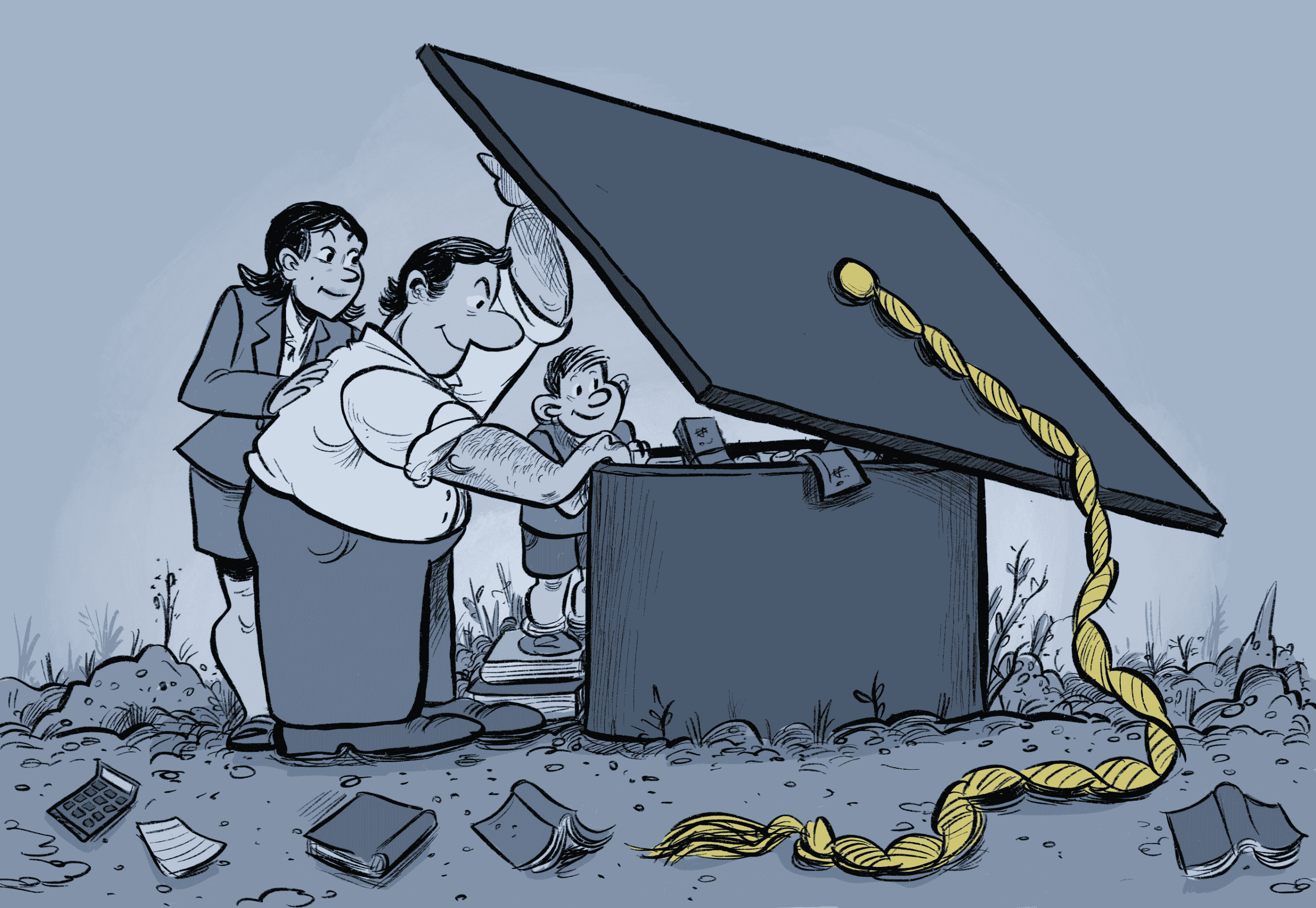
Holding mom’s hand: Guiding parents through the vulnerable years
As life expectancy in Canada rises, we will increasingly be called on to manage accommodations as well as finances for our aging parents. Here are five ways you can help them age gracefully.
Susan kept a vibrant picture of her mom near her hospital bed to remind staff — and maybe herself — that she was an independent and vital person, not just another 83-year-old lady with a failing memory and a broken hip.
Helping Dede has been tough but also inspirational for Susan. Dede’s “such a kind, lovely woman,” Susan says, and her happy attitude has shone through despite the frailties of age wearing her down.
Dealing with Dede’s cognitive problems had been manageable prior to her recent hospital stay. But the fall that put her in the hospital changed everything. While Susan was of course primarily concerned for her mom’s immediate health — stats say life expectancy can decline by as much as 20% following a hip fracture — she had to start thinking about whether her mom could still live on her own, the costs involved, the logistics and the stress. 1
“Most senior’s homes in my area cost $3,000 – $5,000 a month and that does not include any extras like increased support for memory care or having someone ensure she’s taking her pills,” Susan says. She knew that Dede may need long-term care sooner rather than later and wondered how she would get to all her medical and social appointments. But the overarching worry was what her mom’s quality of life would be like from now on.
Nicole Ewing, Director, Tax and Estate Planning, TD Wealth, joins Kim Parlee to talk about some ways you may be able to help your parents with their money without risking your own financial future.
As Susan found out, the responsibility of caring for elderly parents today is stressful in many ways: The trauma of a parent’s sudden illness can come with an equally shocking realization about senior healthcare, accommodations, costs and legalities.
According to Domenic Tagliola, Tax and Estate Planner, TD Wealth, one of the challenges for children may be knowing when the time is right to step in. Utilizing a Power of Attorney (POA) — the legal authority to act on a person’s behalf — to manage the affairs of elderly parents can be tricky: Many children won’t get involved unless there is an overwhelming need but waiting that long could be the wrong approach.
“Figuring out that it’s time for parents to change their living situation, for example, is not always readily apparent if the kids live out of town,” Tagliola says. “Often, it is not the kids who notice that there has been a change in the health of a parent. Sometimes it’s a church group, or a friend or neighbour who says, ‘Mrs. Smith isn’t doing well.’”
If your parents are in or nearing their senior years, there may be a number of tools available that could help ease the transition. Moreover, there are planning steps you can take today that could help in the future when important decisions should be made. Here are some actions you can consider.
Get a plan that fits your parents’ needs
Part of the struggle when helping your parents is understanding the health, financial and safety issues prevalent today, and figuring out what tools you actually need to assist them. For instance, if your dad has cognitive problems, there may not be a straight line of ever-decreasing ability. He could have good days and bad days, and judging what kind of support is appropriate can be complicated, and could impinge on his dignity or privacy. Meanwhile, your parents may be aging at different rates. If there is a plan to sell their home to finance dad’s enhanced healthcare, what happens to your mom who might prefer to live in the family home while she is still healthy and in the workforce?
Working through these scenarios with financial specialists can help head off problems in care before they happen.
Talk to each other about what’s ahead
It may be tough or even presumptuous to step up and begin managing your parents’ affairs, especially if they’ve spent their time and money managing you. But keeping everyone on the same page — talking about what is likely ahead for them health-wise, what kind of lifestyle they would like and the ways to get there — can help ensure that you can make arrangements ahead of time to meet their wishes and work toward providing the best support available.
Chief among the concerns will be: Do your parents have the finances to support a comfortable lifestyle in their declining years and do they have the financial literacy to manage their affairs themselves?
Some of these chats can be uncomfortable and parents may be hesitant to speak about their money situation for a number of reasons. Tagliola suggests enlisting the help of financial or legal specialists who can answer any questions and put them at ease. “Like anyone else, they may be reluctant to suddenly start revealing the state of their money to their children. They could be embarrassed or not want to reveal certain aspects of where the money goes,” he says. “But it can be important to emphasize that having clarity can mean better care down the road.”
Ensure Powers of Attorney are in order
The POA is a key tool to use for protecting your parents in case of their incapacity. The document allows someone close to them — dubbed the attorney — to step in and manage their affairs, pay bills and make decisions on their behalf. Parents should have one in place and they should update it regularly as events dictate. If a parent signed their POA decades ago but has since moved to another province, that POA should be re-written to be valid in the new jurisdiction, Tagliola says.
One of the ideas parents should be aware of is that their overall needs should be documented in the POA in order to ensure, not just the essentials, but the best lifestyle possible, says Tagliola. This means that if a parent suffers a physical or mental impairment, they should not only continue to have sufficient accommodations and healthcare but also access to friends, recreation and services like regular hair and nail treatments.
Set a strategy for accommodations and finances
Tagliola says there’s a wide range of considerations to think about when managing an elderly person’s accommodations. These can include their safety and comfort within an environment, the costs involved and how physically close family and healthcare services are. Naturally, many people want a say on where and how they live — many seniors may be reluctant to leave their family home for instance — but the family should come together and agree on what’s best for parents if they are unable to care for themselves in their current setting. Examples of homes for seniors run from different kinds of “retirement” residences, which can offer a range of optional support, to long-term care homes where 24-hour assistance is provided.
Unfortunately, the rising cost of living in Canada has also impacted housing for seniors: Standard accommodations in Canada (without enhanced daily high-level care) is $3,075 per month on average with wide variation depending on your location. 2 Whatever decisions are made should include proper financing. An adult child may have to step in to manage their money and may even need to sell their home or other assets to help provide appropriate accommodations. Tagliola says a great idea is to work with your parents’ finances years earlier with a goal to save enough for healthcare costs and accommodations.
Help your parents adapt
There are many issues that highlight the fact that adult children not only need to ensure their parents are housed properly and are eating well — they must anticipate what issues could impact their parents’ lives.
Think about how quickly technology changes and how critical those tools are now for day-to-day life. Are your parents going to be left behind if they have trouble transferring money or being notified about a medical appointment or working their TV remote?
And it’s not a coincidence that traditional and online fraudsters target the elderly: Seniors can often become isolated from communities, friends and routines. Many are less savvy to scams and, perhaps out of loneliness or cognitive decline, are more willing to interact with people they shouldn’t. It’s a great idea to ensure your parents are staying mentally sharp, socially aware and getting physical exercise in their daily lives. One tool to prevent fraud is to help your parents register a Trusted Contact Person at their bank: This document enables the bank to contact a friend or family member if it feels your parent may be the victim of a scam or notices any unusual financial activities.
Fortunately for Dede, her recovery has been going better than expected. She’s back in her own home and, while she has a long recovery ahead, she might be able to continue living semi-independently.
Susan has some advice for people who are concerned as their parents get on in years. First, look for healthcare support that’s consistent and that you can rely on: Dede’s pharmacist knows her history and as a result, Susan is far more confident with Dede’s condition knowing she has such a great resource to lean on. She also says people can really learn from the experiences of others as they navigate financial, medical and legal worlds. “Finding out what others did for their parents can keep you from getting lost in confusing systems: You need to build little teams of people who know this stuff to help guide you.”
DON SUTTON
MONEYTALK
- Alexandra Papaioannou et al, Mortality, Independence in Living, and Re-fracture, One Year Following Hip Fracture in Canadians, Echo Care of the Elderly, August, 2000, Accessed Aug. 28, 2023, baycrest.echoontario.ca/wp-content/uploads/2018/06/Mortalit-independence-in-living-and-re-fracture-one-year-following-hip-fracture-in-Canadians.pdf ↩
- Housing options for seniors, Statistics Canada, June 21, 2023, accessed Aug. 31, 2023, https://www.canada.ca/en/financial-consumer-agency/services/retirement-planning/cost-seniors-housing.html ↩













